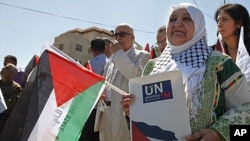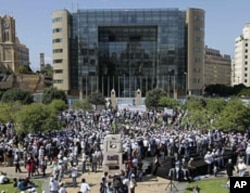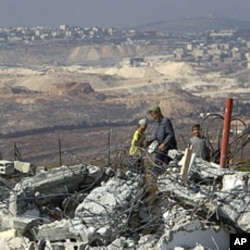Frustrated with the deadlocked negotiations with Israel, Palestinians are seeking a United Nations resolution that would recognize a Palestinian state based on 1967 borders. More than 100 countries have pledged to support the bid, but the final vote could fall short of the two-thirds majority required for final passage.
The Palestinians are poised to submit their request to U.N. Secretary General Ban Ki-moon when President Mahmoud Abbas of the Palestinian Authority addresses the General Assembly on September 23. The Palestinian diplomatic offensive would also need a vote at the Security Council, but the U.S. Congress is demanding President Barack Obama veto full membership in the Security Council.
There are many political, diplomatic and legal consequences for the Palestinians, Israel and the U.S. if Palestinians go ahead with their ambitious bid. In addition to U.S. opposition at the United Nations, Israel is considering a nullification of the Oslo Accords if the Palestinians embark on what Israel sees as a unilateral move.
Academic perspective
Palestinians may try to use a two-third majority in the U.N. General Assembly to skirt the U.S. veto. That option is suggested by their former legal advisor, Professor Francis Boyle, a prominent international law scholar at the University of Illinois. Boyle told VOA that Palestinians may resort to the “Uniting for Peace” Resolution 377, adopted in 1950, which is a rarely invoked move to override by a two-thirds vote any veto that paralyzes the Security Council.
Boyle argues that the Palestinian U.N. bid would provide a lot of practical benefits. “With admitting the Palestinian state as a full member in the UN, it will be able to file formal state-to-state complaints against Israeli officials, it can ratify the Genocide Convention and sue Israel at the International Court,” Boyle said.
Boyle also argues that as a member of the General Assembly, the Palestinian Authority could theoretically try to halt settlement construction once and for all, and automatically make all Palestinians living outside Palestinian territories citizens of their new state. He said the upgraded status of Palestine would provide a strong incentive for Israel to negotiate in good faith and reach the much promoted two-state solution to end the conflict.
Professor Gabriela Shalev, a former Israeli Ambassador to the U.N., said Israel should take seriously the prospect that the Resolution 377 strategy will be invoked. Shalev noted it was used in 1956 when France and Britain imposed a veto in the Security Council on a resolution condemning their attack on Egypt. She also said she would not be surprised if the United States decided to hold back on the veto option this time.
Unintended consequences
However, Guy Goodwin-Gill, Oxford University professor of public international law, who also was a legal adviser to the Palestine Liberation Organization, argues the Palestinian Authority should not pursue its bid for U.N. membership. He warns of possible unintended consequences such a diplomatic offensive could bring.
According to the scholar, the bid could rob Palestinian refugees of legal representation at the U.N. because they would no longer be represented by the PLO. Currently, the PLO is the sole representative of Palestinian people at the world body.
Also, Goodwin-Gill points out that any U.N. admission would not change the Palestinian Authority’s limited legislative and executive competence or its limited jurisdiction over Palestinians not living in the areas under its control.
Hussein Ibish is a senior fellow at the American Taskforce on Palestine, a non-profit organization based in Washington, D.C., and dedicated to a negotiated settlement of the Palestinian-Israeli conflict. Ibish said the academic debate among scholars of international law is theoretical. Instead, he argues that Palestinians should take into consideration the practical consequences of their U.N. bid. Among them, says he, is an inevitable confrontation with the United States and Israel.
“The costs would be American and Israeli retaliation. The United States, which is the single biggest donor to the Palestinian Authority, has the ability to cut off all funding to the authority,” Ibish said. “The Israelis have threatened all kinds of actions, including abrogating the Oslo Accords and withholding Palestinian tax revenues.”
A Palestinian statehood push could also have overall negative consequences for the peace process, says David Makovsky, director of the Project on the Middle East Peace Process at the Washington Institute for Near East Policy.
“The temptation of not going to peacemaking becomes stronger because Palestinians would get a certain baseline of U.N. rights and may feel that negotiations could compromise these rights,” said Makovsky. “Palestinians, through an upgraded status at the U.N., would try to haul Israel before international bodies like the International Court of Justice and that would be a form of warfare in the courtroom.”
Ibish of the American Taskforce on Palestine says Palestinians should also be mindful of what might happen the day after.
“If they receive a diplomatic victory followed by a moment of euphoria, then later realize their conditions will not improve or even get worse, the danger of an outburst of anger would be very great,” said Ibish.
Israeli newspapers report an Israeli contingency plan for mass disorder in the West Bank. According to the plan, dubbed “Operation Summer Seeds,” the Israeli Army is training and arming Jewish settlers to counter possible mass disorder no matter what the outcome of the the Palestinians’ U.N. bid. Ibish described the plan as a recipe for a third, bloodier uprising.
“It would certainly add fuel to the fire, if settlers became more and more a paramilitary force, more Palestinians would see them as legitimate targets,” said Ibish. “You can see the pattern of deterioration from the first intifada to the second, then to the Gaza war. Each one became more military, more violent, bloodier and more religiously fanatic on both sides.”
Possible scenarios and options
The probability is high that Palestinians will petition for full membership status in the U.N. If the United States manages to obstruct that with a veto, there will be a diplomatic price to pay for the U.S. itself as it would be perceived as a superpower crushing the aspirations of the Palestinian people. That, experts say, would result in an increased level of anti-U.S. sentiments in both Arab and Muslim countries.
Among other options for Palestinians is to seek an “upgrade” in status in the General Assembly - from a PLO Observer status to a non-member state observer. While this option will stop short of providing Palestinians with access to the International Court, it would solidify the international consensus that a Palestinian state has to be created.
Another option is to seek more rights and privileges for the PLO mission to the U.N. with language that acknowledges that the international community will not accept any alternative to the two-state solution.
As momentum builds toward the opening the new session of the U.N. General Assembly on September 20, there is a last-minute effort to have Palestinians shelve their U.N. bid and resume two-party talks.
According to The New York Times, the Obama administration is trying to create a viable alternative. To this effect, the administration has circulated a proposal for renewed peace talks with the Israelis in the hopes of persuading President Abbas to abandon the bid for recognition at the United Nations General Assembly.
The New York Times also says the administration is trying to translate the broad principles President Obama outlined in May into a concrete road map for serious talks. The hope is to satisfy Israel, give the Palestinians an alternative to going to the United Nations and win the endorsement of European countries.
Diplomats are also working to bridge far-reaching differences over how to treat Jewish settlements in the West Bank and how to handle Israel’s demand for recognition of its status as a Jewish state. The Palestinians have never acceded to a formal recognition of Israel as a Jewish state. A possible statement by the Quartet (comprised of the United Nations, the European Union, the United States and Russia) would outline a series of meetings and actions to resume talks with the end goal of creating a Palestinian state. The Quartet’s envoy, former British Prime Minister Tony Blair visited Jerusalem last week to negotiate the terms of the proposal with the Israelis. He is expected to discuss it with the Palestinians soon.
The Israelis have so far responded positively to the draft, but the Palestinian position remains unclear. However, President Abbas recently said he would forgo a U.N. vote in favor of real peace talks. The question now is: is there enough time left to resume peace talks in a meaningful way before his U.N. address on September 23?






